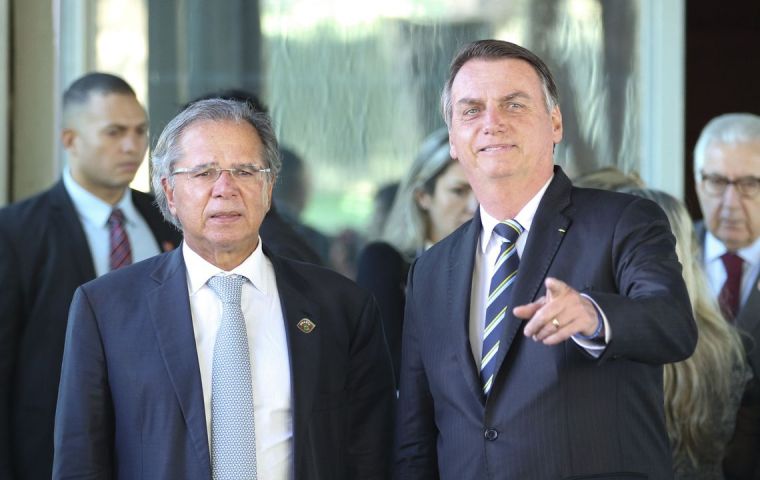MercoPress. South Atlantic News Agency
Bolsonaro unveils fiscal reforms and sends bill to privatize Brazil's largest utility, Electrobras
 Alongside Economy Minister Paulo Guedes, Bolsonaro handed in constitutional amendments that will also, if passed, decentralize budget resources
Alongside Economy Minister Paulo Guedes, Bolsonaro handed in constitutional amendments that will also, if passed, decentralize budget resources  Bolsonaro pushing ahead with an ambitious privatization plan, sent Congress a bill to sell Brazil's largest utility, Eletrobras.
Bolsonaro pushing ahead with an ambitious privatization plan, sent Congress a bill to sell Brazil's largest utility, Eletrobras. Brazilian President Jair Bolsonaro's government unveiled a bundle of wide-ranging reforms on Tuesday, aimed at cutting spending and reducing the size of the state to drive down its chronic fiscal deficit.
Pushing ahead with an ambitious privatization plan, he sent Congress a bill to sell Brazil's largest utility, state-run Centrais Eletricas Brasileiras SA, known as Eletrobras.
Another proposal seeks to end the government's mint monopoly, allowing a private contractor to print the country's currency.
Alongside Economy Minister Paulo Guedes, Bolsonaro handed in constitutional amendments that will also, if passed, decentralize budget resources, ease non-discretionary spending rules, and free up funds to pay down public debt and boost investment in a sluggish economy.
One proposal that will not be popular in Brasilia would enable the government to cut public sector employee salaries, hours and benefits, and end job stability for new hires, to reduce the size of the federal payroll that weighs heavily on the budget.
Guedes said that measure was a priority to start reducing spending and he hoped it would be approved before the end of the year with the help of lawmakers.
The right-wing president and his economy minister are seeking to build on the momentum from a landmark pension reform that was passed by Congress in September.
“We are sure that, in a short time, perhaps early next year, mid-next year at most, this... will become a reality and it will benefit us all,” Bolsonaro said in remarks in Congress that were broadcast on local television.
Lawmakers, however, say none of the major reforms Bolsonaro's government has proposed will pass this year. There is a tight window in 2020 to pass laws before campaigning starts for local elections in October.
Raising taxes to resolve the fiscal crisis is out of the question because Brazil already has one of the highest tax burdens in the world, Treasury Secretary Mansueto Almeida said.
Pensions and payroll were so costly that the government's non-discretionary spending has reached 95 per cent of the budget, he said, increasing a public debt that is close to 80 per cent of gross domestic product.
But with interest rates at a relatively low level and the government committed to respecting a federal spending cap, Guedes said Brazil could eventually return to having a primary budget surplus.
The decentralization of spending, the public employee reform, and, eventually, an overhaul of Brazil's tax system would be nothing less than a “transformation of the Brazilian state,” Guedes said.
“Congress wants to rewrite the history of the Brazilian state machine... We have a wonderful agenda of work ahead for the next six months or one year,” he said.
Even without the tight legislative timetable, the bill seeking approval to privatise Eletrobras may face resistance in Congress, however.
The government has dropped the idea of keeping a golden share in the company that would give it the power to veto decisions once sold, which many lawmakers see as a needed guarantee for the country's security.
Mines & Energy Minister Bento Albuquerque said the state would retain a significant stake in Eletrobras and no shareholder would be allowed to hold more than 10per cent.
Government officials say there are no plans to privatize Petrobras or the two large state banks, Banco do Brasil and Caixa Economica Federal, Brazil's largest mortgage lender.




Top Comments
Disclaimer & comment rulesCommenting for this story is now closed.
If you have a Facebook account, become a fan and comment on our Facebook Page!